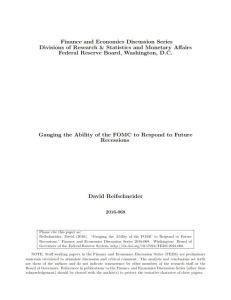Join getAbstract to access the summary!

Join getAbstract to access the summary!
David Reifschneider
Gauging the Ability of the FOMC to Respond to Future Recessions
Federal Reserve Board, 2016
What's inside?
Historically low interest rates could cause problems during the next recession.
Recommendation
In the aftermath of the Great Recession, the Federal Reserve exercised extraordinarily accommodative monetary policy to spur economic growth. While the Fed has plans to lift the short-term federal funds rate in 2017, these increases will still leave the rate significantly lower than its historical average. This dynamic could portend difficulties for the US economy during the next recession. David Reifschneider, a deputy director at the Fed’s Board of Governors, argues that the federal funds rate isn’t the only tool the Fed has to deal with recessions. getAbstract recommends this scholarly but accessible report to executives, investors and policy makers.
Summary
About the Author
David Reifschneider is the deputy director of the division of research and statistics at the Board of Governors of the Federal Reserve System.

















Comment on this summary